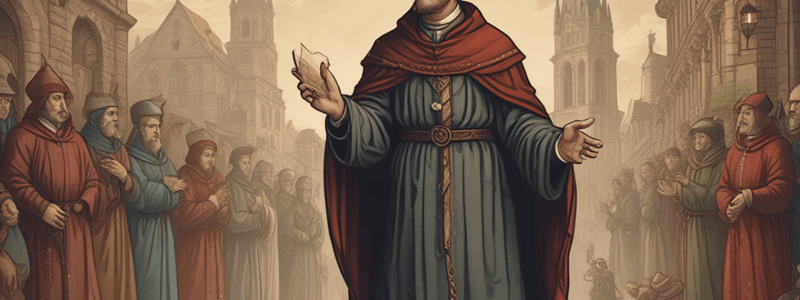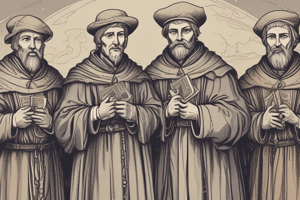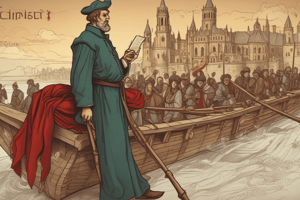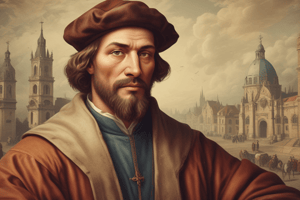Podcast
Questions and Answers
What was the main reason behind Martin Luther's publication of the Ninety-Five Theses in 1517?
What was the main reason behind Martin Luther's publication of the Ninety-Five Theses in 1517?
- To challenge the corrupt practices of the Catholic Church (correct)
- To establish a new religious group
- To promote education for girls and boys
- To emphasize the importance of family in everyday life
What was a significant result of the Protestant Reformation for women?
What was a significant result of the Protestant Reformation for women?
- Restrictions on independent thought
- Increased control over family decisions
- Loss of rights to own property
- Gain of rights to divorce and marry (correct)
What was the belief of John Calvin, a French theologian?
What was the belief of John Calvin, a French theologian?
- Predestination (correct)
- The authority of the Pope
- Salvation through faith in God and the Bible
- The importance of education for girls
What was the Catholic Reformation a response to?
What was the Catholic Reformation a response to?
What was the main goal of the Protestant Reformation?
What was the main goal of the Protestant Reformation?
What was the significance of the Council of Trent?
What was the significance of the Council of Trent?
What was a result of the Protestant Reformation for education?
What was a result of the Protestant Reformation for education?
What was a challenge faced by peasants during the Protestant Reformation?
What was a challenge faced by peasants during the Protestant Reformation?
What was the belief of Anabaptists?
What was the belief of Anabaptists?
What was the significance of the Jesuits?
What was the significance of the Jesuits?
What were the two watchwords of the Protestant Reformation?
What were the two watchwords of the Protestant Reformation?
What was the main goal of the Catholic Counter-Reformation?
What was the main goal of the Catholic Counter-Reformation?
What was the outcome of the 30 Years War?
What was the outcome of the 30 Years War?
Who is credited with the discovery of the Americas in 1492?
Who is credited with the discovery of the Americas in 1492?
What was the name of the process that exchanged goods and people between the Old and New World?
What was the name of the process that exchanged goods and people between the Old and New World?
What was one of the items brought back to the Old World from the New World during the Columbian Exchange?
What was one of the items brought back to the Old World from the New World during the Columbian Exchange?
What was the main reason for the expansion of the Catholic faith during the Age of Exploration?
What was the main reason for the expansion of the Catholic faith during the Age of Exploration?
What was the primary goal of mercantilism?
What was the primary goal of mercantilism?
What was the outcome of the Treaty of Westphalia?
What was the outcome of the Treaty of Westphalia?
Who was the founder of the Jesuit order?
Who was the founder of the Jesuit order?
What was the main consequence of the Columbian Exchange?
What was the main consequence of the Columbian Exchange?
What was the name of the English scientist who developed the scientific method?
What was the name of the English scientist who developed the scientific method?
What was the name of the conflict that took place from 1618 to 1648?
What was the name of the conflict that took place from 1618 to 1648?
What was the name of the era in which European explorers began traveling to other continents?
What was the name of the era in which European explorers began traveling to other continents?
What was the significance of Copernicus' book?
What was the significance of Copernicus' book?
What was the result of the Scientific Revolution on the Catholic Church and monarchies?
What was the result of the Scientific Revolution on the Catholic Church and monarchies?
What was the main goal of the transatlantic slave trade?
What was the main goal of the transatlantic slave trade?
What was the period of time during which the Scientific Revolution took place?
What was the period of time during which the Scientific Revolution took place?
What was the outcome of the Scientific Revolution on the development of new sciences?
What was the outcome of the Scientific Revolution on the development of new sciences?
What was the significance of Isaac Newton's works?
What was the significance of Isaac Newton's works?
Who is credited with formulating the heliocentric model in astronomy?
Who is credited with formulating the heliocentric model in astronomy?
What was Galileo Galilei condemned by the Catholic Church for?
What was Galileo Galilei condemned by the Catholic Church for?
Who is credited with formulating the Laws of Motion and the Law of Universal Gravity?
Who is credited with formulating the Laws of Motion and the Law of Universal Gravity?
What scientific discipline was developed by Vesalius?
What scientific discipline was developed by Vesalius?
What was the key factor that led to the development of medicine and chemistry as disciplines?
What was the key factor that led to the development of medicine and chemistry as disciplines?
What was a key aspect of the scientific approach of the 16th and 17th centuries?
What was a key aspect of the scientific approach of the 16th and 17th centuries?
What was the likely outcome for medicine and chemistry if not for the period's pioneering dissections and experimentation?
What was the likely outcome for medicine and chemistry if not for the period's pioneering dissections and experimentation?
What was a key feature of the scientific approach of the 16th and 17th centuries?
What was a key feature of the scientific approach of the 16th and 17th centuries?
What was a major area of development in mathematics during the period?
What was a major area of development in mathematics during the period?
What was the focus of the scientists of the 16th and 17th centuries in their study of the natural world and the human body?
What was the focus of the scientists of the 16th and 17th centuries in their study of the natural world and the human body?
What was the primary outcome of the Protestant Reformation?
What was the primary outcome of the Protestant Reformation?
What was the focus of the Protestant Reformation?
What was the focus of the Protestant Reformation?
What was the significance of Martin Luther's Ninety-Five Theses?
What was the significance of Martin Luther's Ninety-Five Theses?
What was the result of the Protestant Reformation for the family?
What was the result of the Protestant Reformation for the family?
What was the primary goal of the nationally based Christian sects during the Protestant Reformation?
What was the primary goal of the nationally based Christian sects during the Protestant Reformation?
What was the significance of John Calvin in the Protestant Reformation?
What was the significance of John Calvin in the Protestant Reformation?
What was the Catholic Reformation a response to?
What was the Catholic Reformation a response to?
What was the significance of the Council of Trent?
What was the significance of the Council of Trent?
What was the outcome of the Protestant Reformation for the Pope's power?
What was the outcome of the Protestant Reformation for the Pope's power?
What did the explorers take back to the Old World?
What did the explorers take back to the Old World?
What was the main goal of mercantilism?
What was the main goal of mercantilism?
What was the transatlantic slave trade?
What was the transatlantic slave trade?
What was the significance of the Scientific Revolution?
What was the significance of the Scientific Revolution?
What were the two core principles that guided the Protestant Reformation?
What were the two core principles that guided the Protestant Reformation?
Who is credited with developing the scientific method?
Who is credited with developing the scientific method?
What was the outcome of the Counter-Reformation for the Catholic Church?
What was the outcome of the Counter-Reformation for the Catholic Church?
What was the main reason for the Age of Exploration?
What was the main reason for the Age of Exploration?
What was the outcome of the Scientific Revolution on the Catholic Church and monarchies?
What was the outcome of the Scientific Revolution on the Catholic Church and monarchies?
What was a major breakthrough of the Scientific Revolution?
What was a major breakthrough of the Scientific Revolution?
What was the name of the process that exchanged goods and people between the Old and New World?
What was the name of the process that exchanged goods and people between the Old and New World?
What was the focus of scientists during the 16th and 17th centuries?
What was the focus of scientists during the 16th and 17th centuries?
What was the result of the Columbian Exchange for Native American societies?
What was the result of the Columbian Exchange for Native American societies?
What was the main consequence of the Protestant Reformation for the Catholic Church?
What was the main consequence of the Protestant Reformation for the Catholic Church?
What was a key aspect of the scientific approach of the 16th and 17th centuries?
What was a key aspect of the scientific approach of the 16th and 17th centuries?
Who founded the Jesuit order?
Who founded the Jesuit order?
What was the outcome of the Scientific Revolution on the development of new sciences?
What was the outcome of the Scientific Revolution on the development of new sciences?
What was the outcome of the 30 Years War?
What was the outcome of the 30 Years War?
What was the significance of the Council of Trent?
What was the significance of the Council of Trent?
What was the primary goal of the explorers during the Age of Exploration?
What was the primary goal of the explorers during the Age of Exploration?
Who is credited with formulating the heliocentric model in astronomy?
Who is credited with formulating the heliocentric model in astronomy?
What was the significance of Galileo Galilei's work in the development of astronomy?
What was the significance of Galileo Galilei's work in the development of astronomy?
What is the name of the scientific discipline that Isaac Newton developed?
What is the name of the scientific discipline that Isaac Newton developed?
What was the significance of Vesalius' work in the development of biology?
What was the significance of Vesalius' work in the development of biology?
What was the key factor that led to the development of medicine and chemistry as disciplines?
What was the key factor that led to the development of medicine and chemistry as disciplines?
What was a key aspect of the scientific approach of the 16th and 17th centuries?
What was a key aspect of the scientific approach of the 16th and 17th centuries?
What was the likely outcome for medicine and chemistry if not for the period's pioneering dissections and experimentation?
What was the likely outcome for medicine and chemistry if not for the period's pioneering dissections and experimentation?
What was a major area of development in mathematics during the period?
What was a major area of development in mathematics during the period?
What was the focus of the scientists of the 16th and 17th centuries in their study of the natural world and the human body?
What was the focus of the scientists of the 16th and 17th centuries in their study of the natural world and the human body?
What was condemned by the Catholic Church?
What was condemned by the Catholic Church?
Flashcards are hidden until you start studying
Study Notes
The Protestant Reformation
- Began in 1517 when Martin Luther published his Ninety-Five Theses
- Resulted in large portions of the European population leaving the Catholic Church
- Led to a loss of power for the Pope and Catholic clergy
- Positive consequences included:
- Increased emphasis on education for boys and girls
- Focus on independent thought
- Women gained new rights, such as the right to divorce and marry
- Increased role of the family as the center of life
- Despite the changes, most peasants found it impossible to change their everyday lives, even after leading significant revolts
- Other reformers, such as John Calvin, carried on the causes of the Protestant Reformation
- Calvin believed in predestination
The Catholic Reformation
- Was the Roman Catholic church's counter-movement to address the concerns of Martin Luther and other religious reformers
- The Council of Trent was convened to respond to the Protestant Reformation
- The Jesuits were a religious group created during the Catholic Reformation
- They engaged in extensive missionary activity for Catholicism
The Age of Exploration
- Was a time when European explorers began traveling en masse to other continents, especially the Americas
- Also known as the Age of Discovery
- Lasted from the 15th to the 18th century
- Explorers such as Christopher Columbus, John Cabot, Vasco Nunez de Balboa, and Ponce de Leon claimed new lands for their respective crowns
- The Columbian Exchange was the exchange of plants, fruits, vegetables, disease, and other items between the Old and New Worlds
- Positive consequences included the discovery of new foods from the Americas
- Negative consequences included the destruction of most Native American societies
The Columbian Exchange
- Was the exchange of plants, fruits, vegetables, disease, and other items between the Old and New Worlds after the explorations of Christopher Columbus
- Items taken back to the Old World included turkeys, tomatoes, and habanero peppers
- Items received by the New World included sugarcane, coffee, and horses
- Negative consequences included slavery and disease
Science and the Scientific Revolution
- Was a wave of scholars proposing a new way of thinking that transformed society through the elevation of science as the source of truth
- Key to this was the scientific method, developed by Francis Bacon
- The Scientific Revolution began when Copernicus published a book that challenged the view of the Earth as the center of the universe
- The climax of the Scientific Revolution was when Isaac Newton published his series of books, which used the scientific method to challenge many of the oldest traditional assumptions about the universe
- The Scientific Revolution established science, supported through experiments, as the source of truth, completely changing how society looked at and understood the universe
Medicine and Chemistry in the 16th and 17th Centuries
- Saw medicine and chemistry come into their own as disciplines
- Occurred largely due to the increased emphasis on empiricism by the scientists of the period
- Pioneering dissections, endless experimentation, and dedication to notation and observation led to the development of medicine and chemistry as highly specialized disciplines
The Protestant Reformation
- Began in 1517 when Martin Luther published his Ninety-Five Theses
- Resulted in large portions of the European population leaving the Catholic Church
- Led to a loss of power for the Pope and Catholic clergy
- Positive consequences included:
- Increased emphasis on education for boys and girls
- Focus on independent thought
- Women gained new rights, such as the right to divorce and marry
- Increased role of the family as the center of life
- Despite the changes, most peasants found it impossible to change their everyday lives, even after leading significant revolts
- Other reformers, such as John Calvin, carried on the causes of the Protestant Reformation
- Calvin believed in predestination
The Catholic Reformation
- Was the Roman Catholic church's counter-movement to address the concerns of Martin Luther and other religious reformers
- The Council of Trent was convened to respond to the Protestant Reformation
- The Jesuits were a religious group created during the Catholic Reformation
- They engaged in extensive missionary activity for Catholicism
The Age of Exploration
- Was a time when European explorers began traveling en masse to other continents, especially the Americas
- Also known as the Age of Discovery
- Lasted from the 15th to the 18th century
- Explorers such as Christopher Columbus, John Cabot, Vasco Nunez de Balboa, and Ponce de Leon claimed new lands for their respective crowns
- The Columbian Exchange was the exchange of plants, fruits, vegetables, disease, and other items between the Old and New Worlds
- Positive consequences included the discovery of new foods from the Americas
- Negative consequences included the destruction of most Native American societies
The Columbian Exchange
- Was the exchange of plants, fruits, vegetables, disease, and other items between the Old and New Worlds after the explorations of Christopher Columbus
- Items taken back to the Old World included turkeys, tomatoes, and habanero peppers
- Items received by the New World included sugarcane, coffee, and horses
- Negative consequences included slavery and disease
Science and the Scientific Revolution
- Was a wave of scholars proposing a new way of thinking that transformed society through the elevation of science as the source of truth
- Key to this was the scientific method, developed by Francis Bacon
- The Scientific Revolution began when Copernicus published a book that challenged the view of the Earth as the center of the universe
- The climax of the Scientific Revolution was when Isaac Newton published his series of books, which used the scientific method to challenge many of the oldest traditional assumptions about the universe
- The Scientific Revolution established science, supported through experiments, as the source of truth, completely changing how society looked at and understood the universe
Medicine and Chemistry in the 16th and 17th Centuries
- Saw medicine and chemistry come into their own as disciplines
- Occurred largely due to the increased emphasis on empiricism by the scientists of the period
- Pioneering dissections, endless experimentation, and dedication to notation and observation led to the development of medicine and chemistry as highly specialized disciplines
Studying That Suits You
Use AI to generate personalized quizzes and flashcards to suit your learning preferences.




